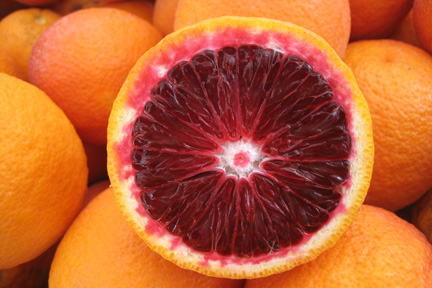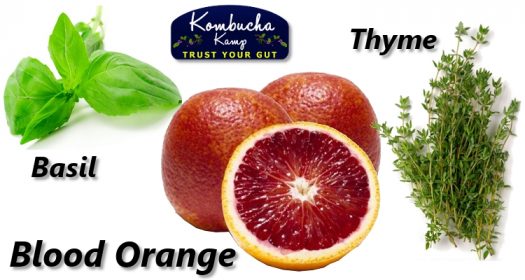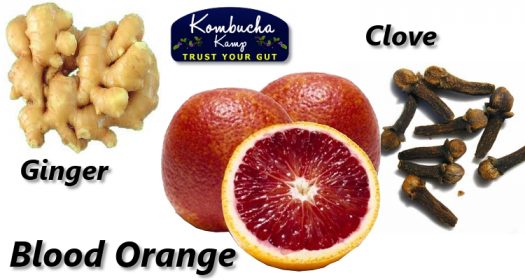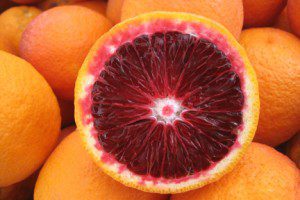
During the late winter and early spring months, a special type of citrus arrives. On the outside they may look like a typical orange, perhaps with just a hint of blush. But once sliced open, the bright red, bursting flesh is stunning to the unprepared. Don’t get any on your shirt! This “bloody” juice makes a delicious base for endless variations of refreshing Blood Orange Kombucha recipes.
The red color of the blood orange comes from the powerful antioxidant anthocyanin. It’s the same thing that makes cherries and apples red. So eating blood oranges will give you all the great benefits of regular oranges (vitamin C, potassium, calcium, and fiber) with an antioxidant bonus!
Blood Orange Varieties
Of the many varieties of blood oranges, the most popular are the Moro, Sanguinello and Tarocco. The Moro is the tartest, originated in Italy, and has the deepest red pigment.
The Spanish Sanguinello arrives later in the season and has sweeter, more tender flesh. Although lighter in color than the other two, the sweet full flavor of the Tarocco makes it perhaps the most prized.
Blood Oranges – Quick Facts!
- Oranges originated in Southeast Asia. Due to their excellent nutritional values and great ability to travel have been cultivated throughout China, India, east Africa, and the Mediterranean. Blood oranges may have evolved independently in both China and the Mediterranean.
- The strong Arab presence during the ninth and tenth centuries promoted the cultivation of oranges throughout the Mediterranean.
- Oranges were also an important commodity of the Roman Empire.
- Two specific gene mutations are responsible for turning regular orange trees into blood oranges. Most oranges only contain one of the genes necessary to create the red pigment.
- California, Texas, and Florida are the main producers of blood oranges in the United States.
- The most colorful oranges come from areas that have hot days and cold nights. That is because large fluctuations in daily temperatures enhance the formation of the red pigment in the oranges.
- Due to their warmer nights, blood oranges from Florida tend to be less red.
On to the Blood Orange Kombucha Recipes!
Blood Orange Italian Soda Kombucha
This recipe is a bit of a twist on the Blood Orange Italian Sodas you may have seen cropping up at your favorite grocery store. Fresh herbs add a delicate aroma while dried herbs will add a bolder flavor. The savory notes of the basil and thyme pair nicely with the sweetness of the blood orange. Plus the natural fizz can’t be beat!
- juice of ½ a blood orange (THRIVE , AMZ)
- 3-4 basil leaves – basil is a good source of calcium, magnesium and iron
- 1 sprig of thyme – strong antibacterial properties, also helps rid the body of phlegm

This combination is refreshing and savory.
Rock the Casbah
The scents and smells of the spice bazaar are close at hand in this flavor. Clove and ginger add an exotic bite. For additional spice try using black peppercorn, cinnamon or cardamom. Mix with tequila to create a unique margarita.
- juice of ½ a blood orange
- ½ tsp of ginger – anti-inflammatory, aids in digestion, and has warming properties
- ½ tsp of clove – this dried flower bud has long been used to freshen breath and helps with toothaches

Bring the exotic to life with this sweet and spicy blend.
Do you use citrus in your Kombucha flavors?
Which types do you like to use?
Share your ideas for Blood Orange Kombucha Recipes in the comments below!


DAISY Lopez
October 21, 2023 at 4:22 amGreat comments. Can we blend the fruit of a puree or is it better in chunks?
Anthea Tayag
October 23, 2023 at 2:31 pmYou can do either, this is more about preference. As always, we recommend what ever is available and easiest.
Bianca
August 2, 2022 at 3:32 pmThis may be a silly question… but are y’all adding the juice to a glass and mixing with finished Kombucha? Or using the juice with the Scooby instead of tea?
Thanks for the ideas!
Anthea Tayag
August 5, 2022 at 10:24 amWe do not recommend flavoring the SCOBY directly, flavoring should be done after the SCOBY and starter liquid have been removed for the next batch. From there, you may add the juice to the Kombucha tea. Alternatively, fruit can be added directly to the Kombucha tea for a couple of days depending on your preferred flavor strength. Afterwards strain out the fruit flavoring and enjoy!
Heidi
March 19, 2014 at 7:53 amHello!are the above recipes for 16oz? I make gallon jars of Kombucha how much would I add to mine to create the taste in your recipes? Thanksso much I can’t wait to try them all!!!
Hannah Crum
March 23, 2014 at 6:25 pmYes, the measurements are for 16oz bottles. 1 cup of fruit or juice is a good place to start for a gallon size batch. Adjust up and down from there based on taste.
Nicky V
June 15, 2013 at 10:49 amLove these receipes! Do drink it right away after adding the orange juice– or do a second ferment (cap and reseal the Kombucha and store it in the cabinet for 5 to 7 days)
Nikki
May 27, 2013 at 9:29 am(That was a 32 oz. bottle)
Nikki
May 27, 2013 at 9:28 amI used juice from 2 blood oranges and a chopped up apricot for one of my first flavoring attempts. It was delicious. 🙂
Betty Durmeier
April 7, 2013 at 6:53 pmWhen my Kombucha is ready I put it in fruit jars and I cut up apples, not peeled, pineapple strawberries, grapes…(what ever fruit I have) and lately I have added some Welches grape juice,in a jar or two,,,, put in fridge. and drink and enjoy the fruit all thru the day,,I love it!!
jim
March 6, 2013 at 7:27 pmWant more fizz in your bucha. Try pineapple,it supercharges it also had great fizz with raspberrys. I love ginger; correander is also very good
Elly L.
September 12, 2012 at 12:52 pmI’m so sorry for asking a stupid question but just to clarify, is this soda or Kombucha? Are you using these interchangeably for this blog? Thanks!
Hannah Crum
September 19, 2012 at 4:14 pmAll of these recipes are for making flavored Kombucha.
Gay
May 24, 2012 at 11:18 pmCan’t wait to try it with Blood Orange. Your warning about the juice staining made me laugh. When my daughter was younger we were over at a friend’s house who had a blood orange tree. The kids were throwing them at each other. They looked horrible, all bloodied up, and the white trim on the house was all “bloody” too!
Marsha
May 20, 2012 at 4:21 pmCorrection: Meyer lemon juice. This was added to 16 oz of Kombucha.
Marsha
May 20, 2012 at 4:19 pmI brewed my second batch of Kombucha using Herbescent Jungle Fruit Green Tea. Then I flavored it with 2 Tbsp. Meyer lemon, 1/2 tsp. fresh ginger and 1 tsp.Truvia. It was very pleasant and mild flavored.
Holly
March 23, 2012 at 2:55 pmI flavored my very first batch of Kombucha with blood orange, and it was delightful!
Karen
March 15, 2012 at 9:29 amTry Orange juice, some orange zest and fresh mint, yummy!! Also berry, orange zest and ginger. Make your Kombucha batch with organic coconut assam tea, wow fantastic! I am having so much fun!! I have made so flavors and I just started!!
hannah
March 15, 2012 at 12:46 pmMmm – those sound like great combos!
Amanda Englund via Facebook
March 14, 2012 at 9:47 amholy Toledo those sound great! i’ve been thinking about making blood orange booch…thanks for the recipe ideas!
NaturallyMariam
March 14, 2012 at 9:35 amI was just planning on flavoring my Kombucha with blood orange once its ready. Blood orange is one of my favorite citrus. I planning a blood orange and a blood orange, turmeric blend.
hannah
March 15, 2012 at 1:11 amMmm, the blood orange-turmeric combo sounds both delicious and healing. A turmeric recipe is coming soon!
Julie Anderson
March 14, 2012 at 9:31 amMy current favorite flavor is Lemon juice and vanilla. My next bottle is an experiment with lemon juice and cinnamon. Lemon and giner is alos good.
I’ve had a great source of free, organic lemons, hence the emphasis on lemon juice.
hannah
March 15, 2012 at 1:12 amI love using fruit in season – especially when it comes from a friend’s tree or yard!